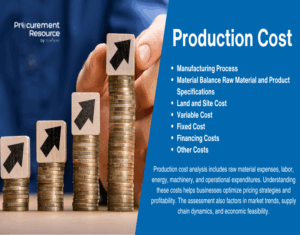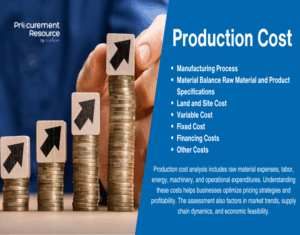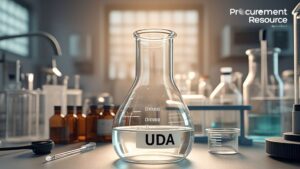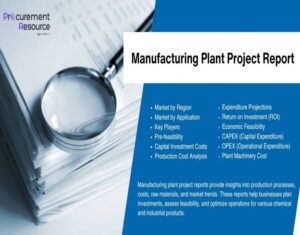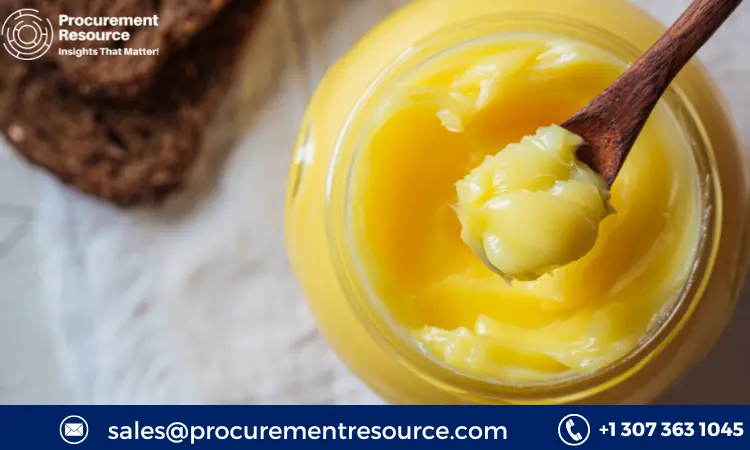
The latest report titled “Butter Oil Production” by Procurement Resource, a global procurement research and consulting firm, provides an in-depth cost analysis of the production process of Butter Oil.
Procurement Resource study is based on the latest prices and other economic data available. It also offers additional analysis of the report with detailed breakdown of all cost components (capital investment details, production cost details, economics for another plant location, dynamic cost model). In addition, the report incorporates the production process with detailed process and material flow, capital investment, operating costs along with financial expenses and depreciation charges.
Request For Free Sample: https://procurementresource.com/production-cost-report-store/butter-oil/request-sample
Procurement Resource’s detailed report describes the stepwise consumption of material and utilities along with a detailed process flow diagram. Furthermore, the study assesses the latest developments within the industry that might influence Butter Oil production cost, looking into capacity expansions, plant turnarounds, mergers, acquisitions, and investments.
Procurement Resource Assessment of Butter Oil Production Process:
1.Butter Oil Production Cost From cream: This report presents the detailed production methodology and cost analysis of butter oil industrial production across butter oil manufacturing plants. To make butter, the cream is separated from whole milk through centrifugation. The cream is then heated and pasteurized before being pre-concentrated to 75% using a centrifuge. Next, the cream goes through a homogenizer to undergo phase inversion. Finally, the cream is separated into buttermilk, called the heavy phase, and butter oil, called the light phase, through a final centrifugal process.
Request For Free Sample: https://procurementresource.com/cost-analysis/butter-oil-production-via-cream/requestsample
2. Butter Oil Production Cost From butter: This report provides the thorough economics of butter oil industrial production across butter oil manufacturing plants. To make butter, 40% cream is first separated from whole milk. Then, phase inversion is used to separate the buttermilk and concentrate the butter to 80%. The mixture is left to rest until the butter’s body is fully developed. Next, the butter is melted and heated to 60% in a processor. After resting for 30 minutes in a holding tank, the butter is pumped into a final concentrator to form butter oil, which separates the water phase.
Request For Free Sample: https://procurementresource.com/cost-analysis/butter-oil-production-via-butter/requestsample
Product Definition:
Butter oil is produced from melting butter at a temperature between 50-80°C. The term butter oil refers to a variety of oil-based products that are created using butter as the main ingredient. Butter oil is a mixture that includes a small amount of water, proteins, and milk sugars, which are referred to as milk solids. To make clarified butter, the mixture is further heated at a low temperature to remove all the water, and then the milk solids are strained out. The resulting clarified butter is called butter oil, a valuable source of omega-3 fatty acids, vitamin K2, and butyric acid.
Butter oil and ghee are two distinct types of milk fat that are derived from different animal species. Butter oil is obtained by melting butter at temperatures ranging from 50-80°C, while ghee is produced by subjecting butter to a higher temperature range of 110-140°C. Both products are characterized by their low moisture content, containing no more than 0.3% water. Despite this, the quality of these products can deteriorate over time due to oxidation processes during storage. It is important to note that the distinctive flavor of both butter oil and ghee is a result of the production process and not due to any added flavors or preservatives.
Market Drivers:
In the past, anhydrous milk fat was mainly consumed in Australia and New Zealand, but with the rise in popularity of fusion food products, it is expected to become more popular in the European Union and United States. This is due to its various uses in the fast-food industry, which is projected to grow rapidly in the next few years, resulting in a significant increase in demand for anhydrous milk fat worldwide. However, there are concerns about the negative health effects of anhydrous milk fat, as it contains high levels of saturated fatty acids and cholesterol, and it is more expensive than vegetable fats, which could slow down market growth.
Looking for an exhaustive and personalised report that could significantly substantiate your business?
Although Procurement Resource leaves no page unfurled in terms of the rigorous research for the commodities that make the heftiest base of your business, we incline more towards tailoring the reports per your specificities. All you need is one-to-one consulting with our seasoned consultants to comprehend the prime parameters you are looking to pin your research on.
Some of the common requests we receive from our clients include:
- Adapting the report to the country/region where you intend to establish your plant.
- Adjusting the manufacturing capacity of the plant according to your needs.
- Customizing machinery suppliers and costs to meet your requirements.
- Providing additional information to the existing scope based on your needs.
About Us:
Procurement Resource ensures that our clients remain at the vanguard of their industries by providing actionable procurement intelligence with the help of our expert analysts, researchers, and domain experts. Our team of highly seasoned analysts undertakes extensive research to provide our customers with the latest and up-to-date market reports, cost models, price analysis, benchmarking, and category insights, which aid in simplifying the procurement process for our clientele.
Procurement Resource work with a diverse range of procurement teams across industries to get real-time data and insights that can be effectively implemented by our customers. As a team of experts, we also track the prices and production costs of an extensive range of goods and commodities, thus, providing you with updated and reliable data.
We, at Procurement Resource, with the help of the latest and cutting-edge techniques in the industry, help our clients understand the supply chain, procurement, and industry climate so that they can form strategies that ensure their optimum growth.
Contact Us:
Company Name: Procurement Resource
Contact Person: Jorge Garcia
Email: sales@procurementresource.com
Toll-Free Number: USA & Canada – Phone no: +1 307 363 1045 | UK – Phone no: +44 7537 132103 | Asia-Pacific (APAC) – Phone no: +91 1203185500
Address: 30 North Gould Street, Sheridan, WY 82801, USA
